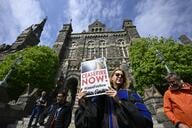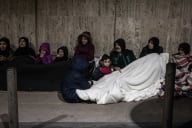You have /5 articles left.
Sign up for a free account or log in.

According to a State Department cable, Secretary Marco Rubio assigned a political appointee to review all Fulbright grant applications and deny those that include disfavored terms.
Curt Rice, director of the Fulbright Commission of Norway, was ready to tie a bow on this year’s cohort of Fulbright scholars back in January.
Norway had selected 17 finalists for the prestigious academic exchange program sponsored by the U.S. State Department and received approval from the Fulbright Foreign Scholarship Board to accept all of them. The country assumed that scholars would be notified by the State Department, as usual, sometime in the following month.
That never happened. Instead, U.S. Secretary of State Marco Rubio sent an internal department cable detailing an additional step for the scholarship’s review process, which historically has entailed an initial project review by the Institute of International Education, a secondary review by a panel in the host country and final approval from the FFSB.
Inside Higher Ed obtained a copy of Rubio’s cable, which says that this year State Department officials would give the final sign-off; they have been tasked with rooting out any projects that could violate President Trump’s executive orders banning diversity, equity and inclusion. All candidates, whether they’d been approved by FFSB already or not, would have to pass.
Rice said that of the 17 finalists Norway selected, the State Department ultimately nixed seven of them—about 40 percent of their expected Fulbright cohort. The grounds for their rejections were “clearly political,” he said: The finalists whose acceptances were overruled all had proposals that dealt with either diversity or climate change. In other European countries whose directors shared their numbers with him, he said, the State Department overrode about 20 percent of the selected finalists.
“There is almost no precedent for them to change a list of finalists sent by a host country,” Rice said.
Rice said State Department staff told him they’d been directed by under secretary for public diplomacy Darren Beattie to conduct keyword searches on finalists’ project proposals and flag those that might violate Trump’s executive orders. Each year the State Department typically awards 8,000 Fulbright grants, and Rice said department staff told him Beattie was running at least that many proposals through the keyword search.
“They claimed that he was going to look at every one of them,” Rice said.
He noted that the department wasn’t going over proposals with a fine-toothed comb, but casting a wide net and issuing rejections based on broad criteria for ineligibility. One project the Norwegian commission accepted that was later rejected by the department focused on science pedagogy in high schools. The section that appeared to have triggered the reviewers, he said, was a one-sentence clause about how “boys and girls tend to have different perspectives on climate change.”
Rubio’s directive will also apply to Fulbright scholars from foreign countries applying to come to the U.S, according to the cable. Earlier this month the U.S. rescinded Fulbright funding and denied a visa for a Finnish researcher studying antiracism in teacher education.
A State Department spokesperson did not respond to questions in time for publication.
‘Politburo Oversight’
Inside Higher Ed spoke with roughly a dozen Fulbright advisers at colleges across the country who said they saw the Trump administration’s hand clearly in this year’s selection process; all asked to remain anonymous to speak without their universities’ permission. Most said their rejected applicants’ research proposals bore some relation to DEI, gender, immigration or climate change. One called the vetting process “politburo oversight.”
All said that this level of intervention from the government—or any intervention at all—was unprecedented.
“They’re looking at the content of applications,” said another adviser. “That is not something that the FFSB, State Department or IIE had ever been involved in before.”
It is FFSB policy not to inform applicants of the reason for their rejection, so those who might have been finalists but were rejected in the new review round wouldn’t know that, leading to whiplash, confusion and frustration for would-be Fulbrighters.
In Slack channels and Reddit threads for this cycle’s Fulbright hopefuls, dozens of applicants shared theories as to why they were rejected. Many said they proposed projects that included mentions of gender, race, disability or the words “critical theory” or “climate change.”
One adviser, who requested anonymity to avoid backlash against their institution, said they’d called the Fulbright commissioner of a European country after one student, whose project focused on refugees with disabilities, seemed to receive conflicting information about her status.
The director said that the student had not been selected but had also not been rejected, the adviser said. She was “in limbo,” the director said, and she wasn’t the only one. The director told the adviser that they and their colleagues were “furious” that the State Department appeared to have overridden a significant number of their selections.
“There had never been intervention by the under secretary before,” the adviser said. “To me, it seems pretty explicit what happened.”
Christopher Martel, an education professor at the University of Massachusetts at Boston, applied for a Fulbright to study how schools in countries with growing immigrant populations, including Japan, Norway and South Korea, teach about democracy and multiculturalism—a term that Trump’s anti-DEI executive order’s lists as a potential flag.
He received an email from IIE, which he shared with Inside Higher Ed, saying that while he’d been “recommended by the peer review panel,” he was not chosen as a finalist. The email included no reference to the new gantlet that proposals had to pass through at the State Department; in fact, neither IIE nor the Trump administration has publicly disclosed the existence of this new step.
Most Fulbright applicants and advisers have found out through word of mouth, or via the Norwegian commission, where Rice has become a uniquely vocal figure publicly opposing the changes to Fulbright selection. He believes the department’s last-minute change may even violate the bilateral treaty that created the Fulbright program in Norway—as well as any other bilateral Fulbright treaties, which is how many of the programs got their start.
“This is a binational, bilateral organization and the Trump administration has acted unilaterally,” Rice said. “From a layperson’s perspective, it seems in violation of the Fulbright policies.”
Transforming the Cohort
According to student advisers, applicants and staff in foreign countries’ Fulbright Commission offices, some of whom spoke on background to avoid federal scrutiny, the added step to this year’s selection process was an unusual and disruptive move that not only delayed Fulbright notifications by months but appears to have reshaped the cohort and led to a smaller pool of finalists.
One adviser shared that about half as many of their applicants were selected this year compared to 2024–25; another said their total was only about a third of the average yield. One said they normally have two finalists and this year had none, despite having three times as many semifinalists as usual. For another, whose institution is one of the top producers of Fulbright scholars, this was their worst cycle in 10 years.
“We have no proof that these proposals were rejected outright due to their subject matter,” one adviser said. “At the very least, the lack of clarity regarding the methods of this ‘one-time supplement’ makes it difficult to trust that our applicants were assessed solely on merit.”
One Fulbright adviser said they aren’t sure whether to encourage current students to apply for next year’s cohort.
“They haven’t said what those terms of that review are, so how do you advise students on whether it’s even worth your time applying for a Fulbright?” the adviser said. “They could spend a lot of time on that application, only to make it all the way to the end stage a year from now and find out that you were never going to be seriously considered. We don’t want to put students in that position.”
They’ve also seen a sharp uptick in alternates this year, which one adviser speculated could be due to uncertainty caused by the irregular review process.
Rice said he hopes that means some of the empty slots will be filled by alternates. But it doesn’t seem feasible this late in the year, he said, adding that contacts at the State Department expressed the same doubts.
“The State Department has said informally to us, ‘Maybe we can’t handle alternates this year,’” Rice said. “That would lead to a much smaller cohort than usual.”
Martel said it’s not just the size of the cohort that’s changing but also the types of projects. He worries about a broad chilling effect for research on topics that could now be considered taboo, or at least disadvantageous when applying for the most robust public grants.
“There did not used to be this kind of partisan layer to the process, and I’m deeply worried about knowledge generation in these fields,” he said. “These things have ripple effects, and I think the intent here is probably to silence research in certain areas.”





